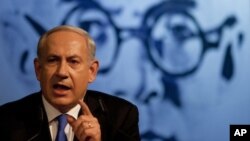Israeli Prime Minister Benjamin Netanyahu on Sunday called for early parliamentary elections, indicating that he would like them to be held in four months. Mr. Netanyahu's right-wing coalition has been one of the most stable in recent times. But there were growing divisions, primarily over domestic issues.
Israeli Prime Minister Benjamin Netanyahu called for the dissolution of his coalition government more than a year before scheduled elections and told cheering members of his Likud party that he would like elections to be held in September.
Mr. Netanyahu said he did not want a year and a-half of instability and that a short campaign period of four months would ensure political stability. He added that political instability always brings "extortion" and "populism," which harm security, the economy and society.
Recent public opinion surveys indicate that the prime minister remains popular and that his center-right Likud party likely would win enough votes to allow him to form the next government.
Mr. Netanyahu's political coalition, formed three-and-a-half years ago, has split over a controversial law that exempts ultra-Orthodox Jews and Arab Israelis from military or civilian service. Nationalist-secular parties in the ruling coalition say all Israelis should serve. Highly religious parties reject this.
Jerusalem businessman Eli Tal says the government is stable, but indecisive. “Probably the hard decisions they should make, they don't feel enough in-power to make the really serious decisions," he said.
For many Israelis, the economy is the main issue. Demonstrations over the high cost of living and lack of social services rocked the Netanyahu government last year.
Adi Botshvalb says the rent for a small apartment today costs 3,000 shekels or nearly $1,000.
“The prices here are crazy. You need to pay around 3,000 shekels for a good place, and apartment. We pay 2,600 [shekels] and we live in, like, a little basement," he said.
In addition, the Israeli military wants more funds to face what it says is rising antagonism in the region, following last year's popular uprisings known as the Arab Spring. There are also fears of a conflict if Israel carries out its threat to attack Iran's suspected nuclear weapons facilities. Iran denies it is building nuclear weapons. As a result, the Netanyahu government was facing a major battle over next year's budget.
Hebrew University political scientist Abraham Diskin says the divisions in Mr. Netanyahu's ruling coalition are typical of Israeli politics.
“What really matters in Israeli elections is the balance between the two blocks, the right-wing parties and the left-wing parties. And the balance is very fragile," he said.
Analysts say that during the election campaign, the Israeli government will be less likely to launch a military strike against Iran, fearing an electoral backlash if the operation fails. They also say the campaign period will likely further delay the stalled Middle East peace talks as Palestinian leaders wait, hoping for a more flexible negotiating partner.
The proposed elections must be approved by the Israeli parliament, which is scheduled to meet on Monday. Leaders across the political spectrum have said they support an early vote.
News
Israeli PM Calls for Early Parliamentary Elections
- By Scott Bobb





